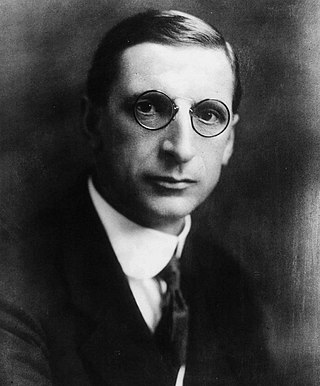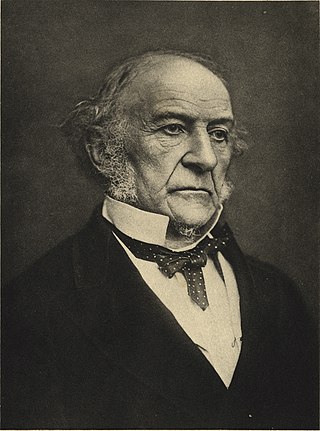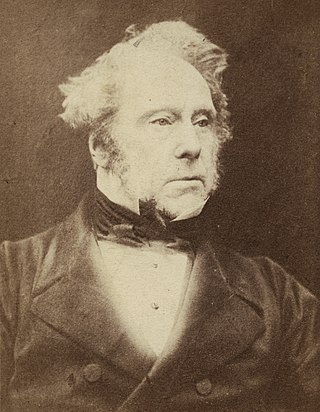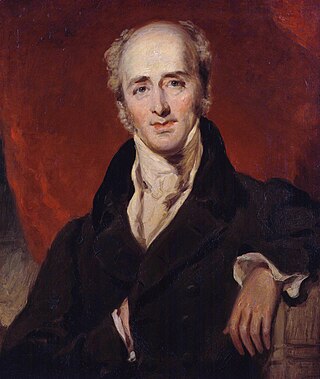
The Irish component of the 1918 United Kingdom general election took place on 14 December 1918. It was the final United Kingdom general election to be held throughout Ireland, as the next election would happen following Irish independence. It is a key moment in modern Irish history, seeing the overwhelming defeat of the moderate nationalist Irish Parliamentary Party (IPP), which had dominated the Irish political landscape since the 1880s, and a landslide victory for the radical Sinn Féin party. Sinn Féin had never previously stood in a general election, but had won six seats in by-elections in 1917–1918. The party had vowed in its manifesto to establish an independent Irish Republic. In Ulster, however, the Unionist Party was the most successful party.

The 1886 United Kingdom general election took place from 1 to 27 July 1886, following the defeat of the Government of Ireland Bill 1886. It resulted in a major reversal of the results of the 1885 election as the Conservatives, led by Lord Salisbury, were joined in an electoral pact with the breakaway Unionist wing of the Liberals led by Lord Hartington and Joseph Chamberlain. The new Liberal Unionist party elected 77 members and gave the Conservatives their parliamentary majority, but did not join them in a formal coalition.

The 1885 United Kingdom general election was held from 24 November to 18 December 1885. This was the first general election after an extension of the franchise and redistribution of seats. For the first time a majority of adult males could vote and most constituencies by law returned a single member to Parliament, fulfilling one of the ideals of Chartism to provide direct single-member, single-electorate accountability. It saw the Liberals, led by William Gladstone, win the most seats, but not an overall majority. As the Irish Nationalists held the balance of power between them and the Conservatives who sat with an increasing number of allied Unionist MPs, this exacerbated divisions within the Liberals over Irish Home Rule and led to a Liberal split and another general election the following year.

The 1874 United Kingdom general election saw the incumbent Liberals, led by William Gladstone, lose decisively, even though their party won a majority of the votes cast. Benjamin Disraeli's Conservatives won the majority of seats in the House of Commons, largely because they won a number of uncontested seats. It was the first Conservative victory in a general election since 1841. Gladstone's decision to call an election surprised his colleagues, for they were aware of large sectors of discontent in their coalition. For example, the nonconformists were upset with education policies; many working-class people disliked the new trade union laws and the restrictions on drinking. The Conservatives were making gains in the middle-class, Gladstone wanted to abolish the income tax, but failed to carry his own cabinet. The result was a disaster for the Liberals, who went from 387 MPs to only 242. Conservatives jumped from 271 to 350. Gladstone himself noted: "We have been swept away in a torrent of gin and beer".

The 1865 United Kingdom general election saw the Liberals, led by Lord Palmerston, increase their large majority over the Earl of Derby's Conservatives to 80. The Whig Party changed its name to the Liberal Party between the previous election and this one.

The 1859 United Kingdom general election returned the Liberal Party to a majority of seats in the House of Commons. The Earl of Derby's Conservatives formed a minority government. but despite having made small overall gains in the election, Derby's government was defeated in a confidence vote by an alliance of Palmerston's Whigs together with Peelites, Radicals, and the Irish Brigade. Palmerston subsequently formed a new government from this alliance which is now considered to be the first Liberal Party administration.

In the 1857 United Kingdom general election, the Whigs, led by Lord Palmerston, won a majority in the House of Commons as the Conservative vote fell significantly. The election had been provoked by a vote of censure in Palmerston's government over his approach to the Arrow affair which led to the Second Opium War.

The 1841 United Kingdom general election, was held between 29 June and 22 July 1841 to elect the new Parliament of the United Kingdom. In this election, there was a large swing as Sir Robert Peel's Conservatives took control of the House of Commons. Melbourne's Whigs had seen their support in the Commons erode over the previous years. Whilst Melbourne enjoyed the firm support of the young Queen Victoria, his ministry had seen increasing defeats in the Commons, culminating in the defeat of the government's budget in May 1841 by 36 votes, and by 1 vote in a 4 June 1841 vote of no confidence put forward by Peel. According to precedent, Melbourne's defeat required his resignation. However, the cabinet decided to ask for a dissolution, which was opposed by Melbourne personally, but he came to accept the wishes of the ministers. Melbourne requested the Queen dissolve Parliament, leading to an election. The Queen thus prorogued Parliament on 22 June.

The 1832 United Kingdom general election was the first United Kingdom general election held in the Reformed House of Commons following the Reform Act, which introduced significant changes to the electoral system.
Armagh or County Armagh is a former county constituency in the House of Commons of the United Kingdom. It was a two-member constituency in Ireland from 1801 to 1885 and a single-member constituency in Northern Ireland from 1922 to 1950. It was replaced in boundary changes in 1983.
Frederick Walter Scott Craig was a Scottish psephologist and compiler of the standard reference books covering United Kingdom Parliamentary election results. He originally worked in public relations, compiling election results in his spare time which were published by the Scottish Unionist Party. In the late 1960s he launched his own business as a publisher of reference books, and also compiled various other statistics concerning British politics.

The Representation of the People Act 1918 was an act of Parliament passed to reform the electoral system in Great Britain and Ireland. It is sometimes known as the Fourth Reform Act. The Act extended the franchise in parliamentary elections, also known as the right to vote, to men aged over 21, whether or not they owned property, and to women aged over 30 who resided in the constituency whilst occupying land or premises with a rateable value above £5, or whose husbands did. At the same time, it extended the local government franchise to include women aged over 30 on the same terms as men. It came into effect at the 1918 general election.

Bath is a constituency in the House of Commons of the Parliament of the United Kingdom represented by Wera Hobhouse of the Liberal Democrats.

Birkenhead is a constituency in Merseyside represented in the House of Commons of the UK Parliament since 2024 by Alison McGovern of the Labour Party.

Windsor (/ˈwɪnzə/) is a constituency of the House of Commons in the UK Parliament represented since 2024 by Jack Rankin of the Conservative Party. It was re-created for the 1997 general election after it was abolished following the 1970 general election and replaced by the Windsor and Maidenhead constituency.

Gloucester is a constituency centred on the cathedral city and county town of the same name, represented in the House of Commons of the UK by Alex McIntyre of the Labour Party

The Repeal Association was an Irish mass membership political movement set up by Daniel O'Connell in 1830 to campaign for a repeal of the Acts of Union of 1800 between Great Britain and Ireland.
The Irish Conservative Party, often called the Irish Tories, was one of the dominant Irish political parties in Ireland in the 19th century. It was affiliated with the Conservative Party in Great Britain. Throughout much of the century it and the Irish Liberal Party were rivals for electoral dominance among Ireland's small electorate within the United Kingdom of Great Britain and Ireland, with parties such as the movements of Daniel O'Connell and later the Independent Irish Party relegated into third place. The Irish Conservatives became the principal element of the Irish Unionist Alliance following the alliance's foundation in 1891.
The 1919 St Albans by-election was a parliamentary by-election held in England in December 1919 for the House of Commons constituency of St Albans in Hertfordshire.
















